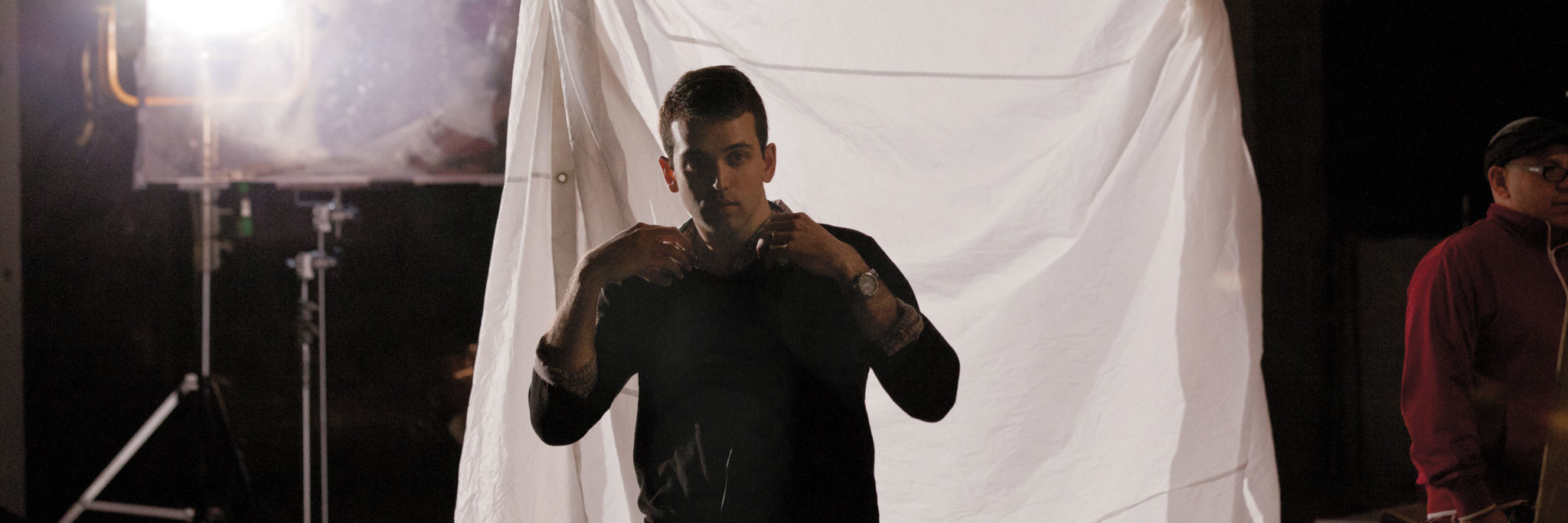To trace the roots of the short film The Feed, you’d have to go back to Idaho in 2003, when a father and his 17-year-old son were taking a morning run along the Boise River. It all began as a casual conversation about an idea for a book. Several years later, English professor Kirk Combe published the result of that conversation with his son Clayton: a dystopian novel, 2084, about what happens when a corporation takes over the American government. And he always kept the idea of turning it into a film in the back of his mind. “I’ve always thought of this book as a movie,” he said. “It needed to be on screen.”
With such a goal in mind, Kirk and Clayton, now a 26-year-old filmmaker in New York City, began to collaborate on a screenplay, trading ideas and scenes back and forth over email. Kirk wrote the dialogue; Clayton filled in the action. Soon they had a script for a 10- to 12-minute film. Add in financial backing from their family, a grant from the Denison University Research Foundation, and producer Rik Cordero of Three/21 Media (known for his documentary work and for music videos for The Roots, Wu Tang, and Snoop Dogg), and in 2011 the Combes were ready to go. They spent 10 days in Newark, N.J., and the Iron Triangle in Queens, N.Y., building sets and shooting the film with a cast and crew of about 30.
Based on the fifth chapter of 2084, The Feed introduces one of the main characters of the story, Oak Wat, a former soldier in his mid-20s, who has just deserted CorpTroops, the military force controlled by the corporate entity TexArc that overtook the American government in the 2030s. Wat goes into a fast-food joint, McSlurrys, where the customers choose between various strains of a sludge-like substance (achieved by the crew during filming with a mix of Quaker oats, broccoli soup, and water), and fed to them through tubes connected directly to their stomachs. There Wat experiences something unexpected: “the seed of uprising, a radical idea he’d never heard before—the birth of a revolution.”
The name of the chapter and the short film, The Feed, refers not only to the feeding process, but also to the relentless audio/visual feed delivered through contact lenses and electrode bands implanted in the brains of the men and women, Wat included, in the lowest working class of the TexArc state. A mix of advertisements, stock market updates and political and religious propaganda, the feed appears as four small, constantly changing screens over the characters’ vision, giving them a distracted look and unfocused, sparkling eyes.
For Clayton, having his dad on set and in “video village”—the isolated, off-set area of folding chairs where the director, production designer, and producers watch what the camera is shooting via television monitors—was crucial. “It was great to have him there as someone watching it like a movie,” Clayton said. “I look at the screen and see what’s below the surface. [His] viewpoint is a valuable one to have when I’m too immersed in the details.”
For his part, Kirk prided himself on being neither “the overbearing dad nor the overbearing author,” and enjoyed the process of seeing others take the story he wrote and tell it visually. “It’s so amazing to have written something and then see people take it seriously, build sets for it, act it all out. Having your writing come to life is really amazing.”
While the film is still in postproduction and awaiting the final scene, set to be shot this summer, the Combes have been working alongside Cordero to drum up publicity and additional funds through social media campaigns. They aim to have the entire film finished by early fall, just in time to submit it to all the major film festivals: Sundance, South by Southwest, Tribeca, Cannes.
“Our master plan and desperate hope is that someone like Peter Jackson will see it and want to make it a feature,” says Kirk, laughing. “But I’m not counting on it. I’ve got a day job. This just does Clayton’s career a whole lot of good. Really, I wouldn’t be doing this if I weren’t doing it with Clayton.”

